Tap into Success – Zip Code Estimates for Driveway Excellence!
- Accurancy
- Efficiency
- Transparency
- Customization
- Time Saving
- Professionalism
- Cost Control
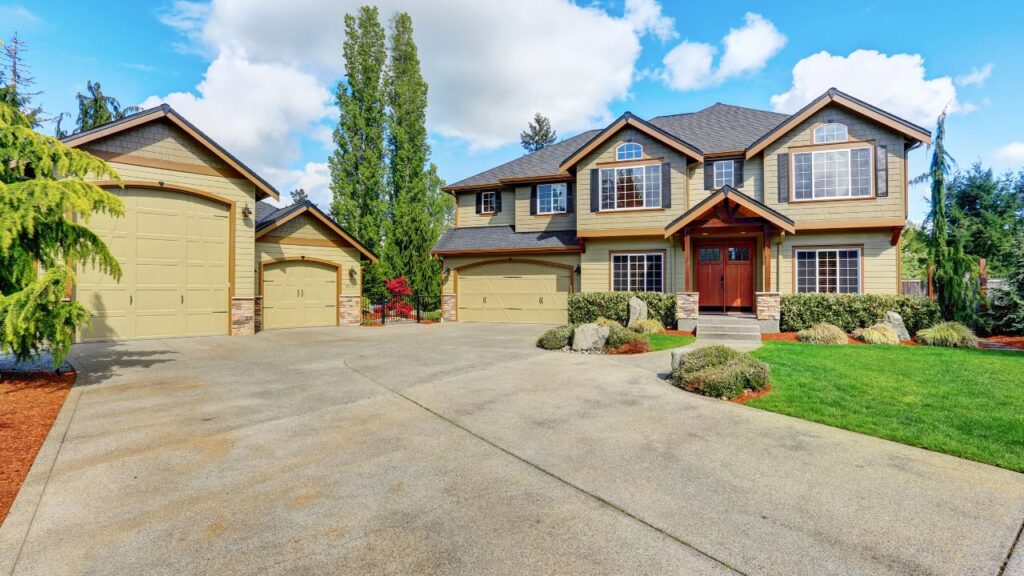
If you’re curious about the cost of installing a gravel driveway, you’ll be pleased to discover that it stands out as the most budget-friendly option among driveway materials. On average, individuals typically invest around $2,000, covering both labor and materials, for the construction of a 100-foot-long and 10-foot-wide gravel driveway.
The cost estimate for a gravel driveway typically falls in the range of $3 to $5 per square foot. This affordability makes gravel driveways an attractive choice for homeowners seeking a cost-effective yet durable solution for their driveway needs. Keep in mind that the overall cost may vary depending on factors such as the type of gravel chosen, the local labor rates, and any additional features or preparations required for the specific driveway site. Gravel driveways not only provide a cost-effective solution but also offer a rustic charm and are known for their ease of installation and maintenance.
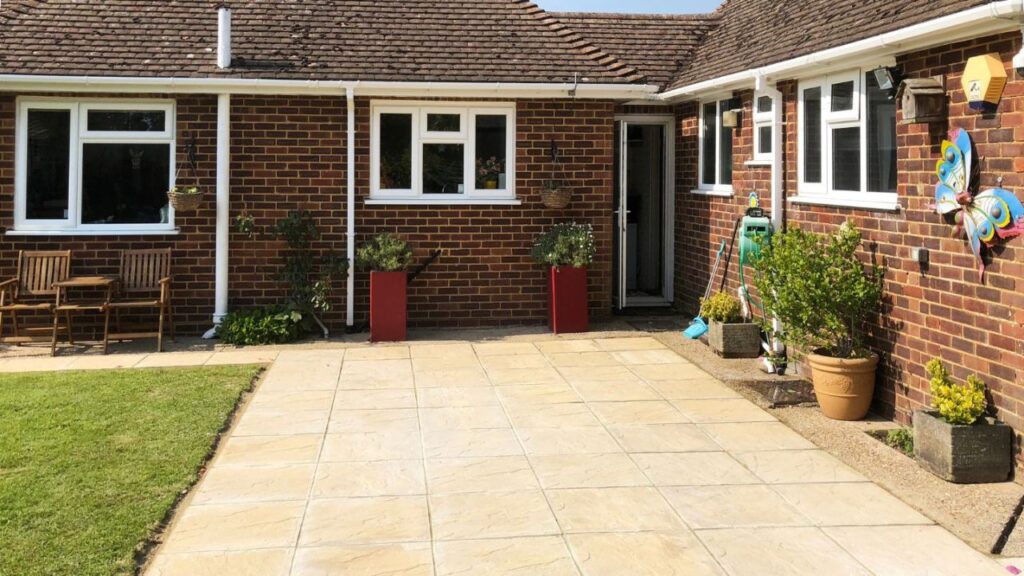
The cost of materials is a critical component in determining the overall expense of a gravel driveway. Gravel comes in various types, each with its price range.
Gravel quality significantly influences costs. Basic pea gravel provides affordability but may lack the durability of crushed stone, impacting the long-term investment. Choosing higher-quality gravel for the top layer ensures both aesthetics and functionality.
Geographic variations also play a role in material costs. Sourcing gravel locally can result in significant cost savings, as transportation expenses are minimized. Prices may fluctuate based on regional availability and demand.
Labor costs are another key consideration, varying based on factors such as skill level, project complexity, and preparation needs.
Skilled labor is essential for a successful driveway installation, ensuring the longevity and stability of the gravel surface.
Installing a gravel driveway involves the use of heavy machinery, including loaders and graders. These specialized tools are necessary for moving large quantities of gravel and ensuring an even surface. While homeowners may not own such equipment, the costs associated with their use are factored into the overall project budget.
An alternative approach to budgeting for this project involves considering the size of the driveway and its capacity for accommodating cars. Homes with only one or two cars typically incur lower costs, whereas larger driveways designed for three or more cars come with higher expenses. While each driveway varies in scale, depth, and the cost of gravel, there are average dimensions for one-, two-, and three-car driveways that provide a ballpark estimate of the overall cost.
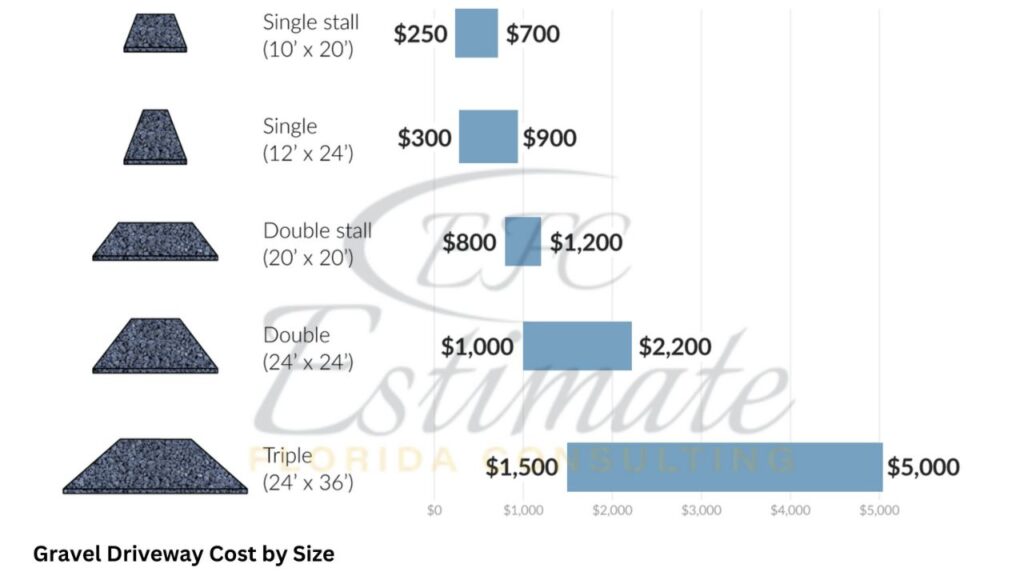
Size | Cost (Labor Included) |
Single Stall (10’ x 20’) | $250 – $700 |
Single (12’ x 24’) | $300 – $900 |
Double Stall (20’ x 20’) | $800 – $1,200 |
Double (24’ x 24’) | $1,000 – $2,200 |
Triple (24’ x 36’) | $1,500 – $5,000 |
For small single stall or single gravel driveways accommodating one car and ranging from 10′ to 24′ in size, the cost typically falls between $250 and $900. This size is practical for homes in bustling neighborhoods or those situated close to the street. If you own a compact sedan or SUV, a single stall should suffice. However, for multiple vehicles or larger ones, additional space is essential.
Opting for a medium-sized driveway, priced between $800 and $2,200, is ideal for households with two vehicles. This category includes double stall driveways measuring 20′ x 20′ or slightly larger doubles at 24′ x 24′. These driveways comfortably accommodate two standard-sized cars. If you have two larger vehicles or an RV, extra space may be necessary. Medium-sized driveways are commonly found in suburban U.S. homes, providing ample room for families to navigate in and out of their vehicles.
Long driveways, designed to fit three cars, typically cost between $1,500 and $5,000. This size is well-suited for growing families or homes where each member owns a car. Long driveways also cater to oversized vehicles like trucks, RVs, or boats. Triple car garages, commonly measuring 24′ x 36′, impart an estate-like aesthetic that enhances curb appeal. While longer driveways require more materials and maintenance, the added space and privacy are often considered worthwhile.
The cost of driveways varies depending on the type of gravel used. A standard driveway typically consists of three layers of stone, starting from sizes akin to baseballs and gradually reducing to small gravel. The choice of material becomes crucial, especially for the top layer, which is the most visible.
Certain materials are specifically designed for edging and should not be used to cover the entire top layer of the driveway. In the table below, we provide a comparison of the average cost per square foot, per ton, and per cubic yard for each type of gravel, focusing on material prices only. It’s important to note that the price range varies for different gravel types, as some offer more variety than others. While cost per ton is the most common budgeting metric due to the quantity needed, per square foot and per cubic yard are also viable options.
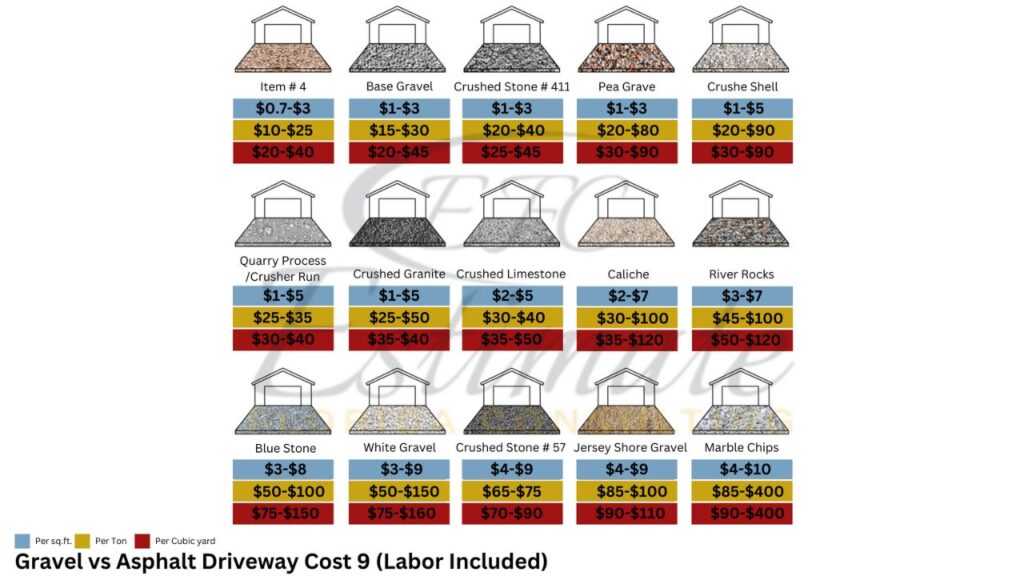
Type | Per Sq.Ft. | Per Ton | Per Cu. Yd. |
Item #4 | $0.70 – $3 | $10 – $25 | $20 – $40 |
Base Gravel #3 | $1 – $3 | $15 – $30 | $20 – $45 |
Crushed Stone #411 | $1 – $3 | $20 – $40 | $25 – $45 |
Pea Gravel | $1 – $3 | $20 – $80 | $30 – $90 |
Crushed Shell | $1 – $5 | $20 – $90 | $30 – $90 |
Quarry Process/Crusher Run | $1 – $5 | $25 – $35 | $30 – $40 |
Crushed Granite | $1 – $5 | $25 – $50 | $35 – $40 |
Crushed Limestone | $2 – $5 | $30 – $40 | $35 – $50 |
Caliche | $2 – $7 | $30 – $100 | $35 – $120 |
River Rocks | $3 – $7 | $45 – $100 | $50 – $110 |
Blue Stone | $3 – $8 | $50 – $100 | $75 – $150 |
White Gravel | $3 – $9 | $50 – $150 | $75 – $160 |
Crushed Stone #57 | $4 – $9 | $65 – $75 | $70 – $90 |
Jersey Shore Gravel | $4 – $9 | $85 – $100 | $90 – $110 |
Marble Chips | $4 – $10 | $85 – $400 | $90 – $400 |
Gravel and asphalt driveways are both commonly used, but asphalt is considered a more upscale choice with a corresponding higher cost. Gravel stands out as one of the most cost-effective methods for establishing permanent driveways. A medium-grade stone driveway, suitable for two cars, typically costs around $1,750. In contrast, an asphalt driveway of the same size comes with a nearly double price tag at $3,600 for mid-grade bitumen, making it a less budget-friendly option.
Despite the higher cost, many homeowners find the investment worthwhile due to the smooth surface of asphalt, providing ease of walking and driving. Families with young children who engage in activities like biking or playing in the driveway and front yard often find that an asphalt driveway is more suitable. While asphalt requires less frequent maintenance, gravel becomes a more favorable choice in warmer climates. Asphalt tends to become uncomfortably hot and soft in high temperatures, and it is also more prone to cracking or crumbling in colder climates with inadequate drainage.
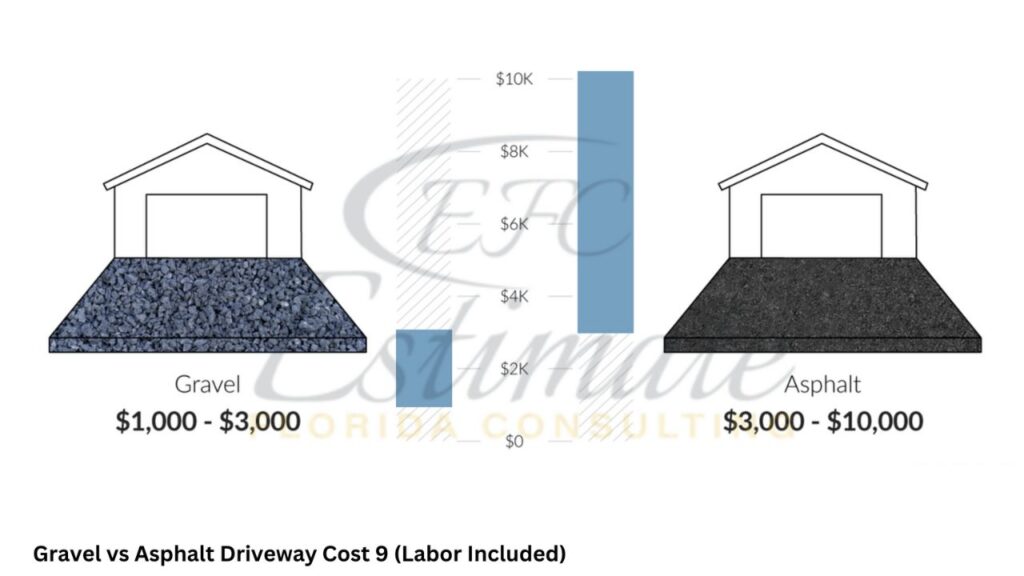
Material | Average Cost (Labor Included) |
Gravel | $1,000 – $3,000 |
Asphalt | $3,000 – $10,000 |
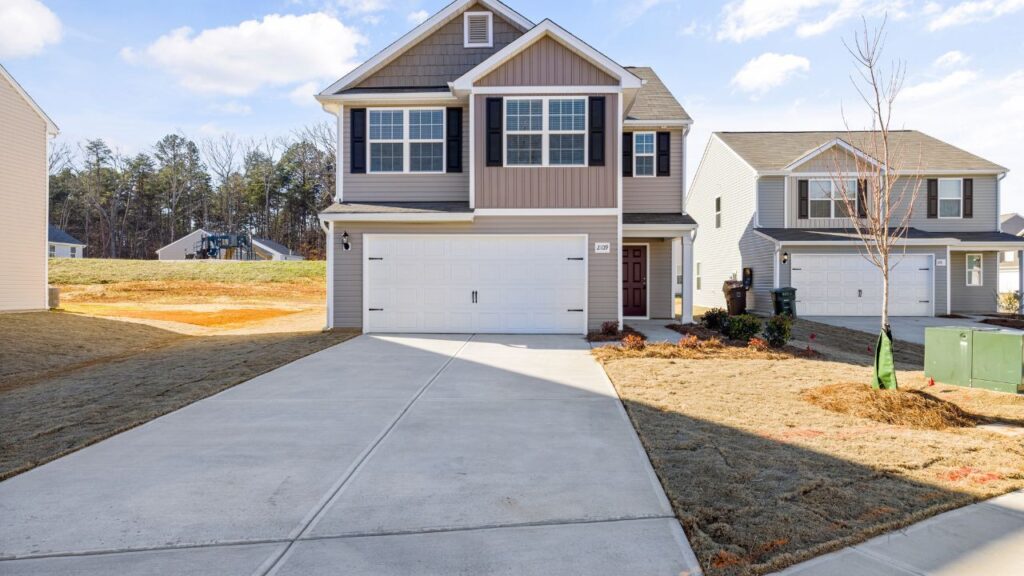
Determining the size and depth of your driveway is crucial for calculating the amount of material required.

The size of the proposed driveway is a significant factor influencing costs.
The type of gravel you choose also affects costs.
The thickness of the gravel layer is another consideration.
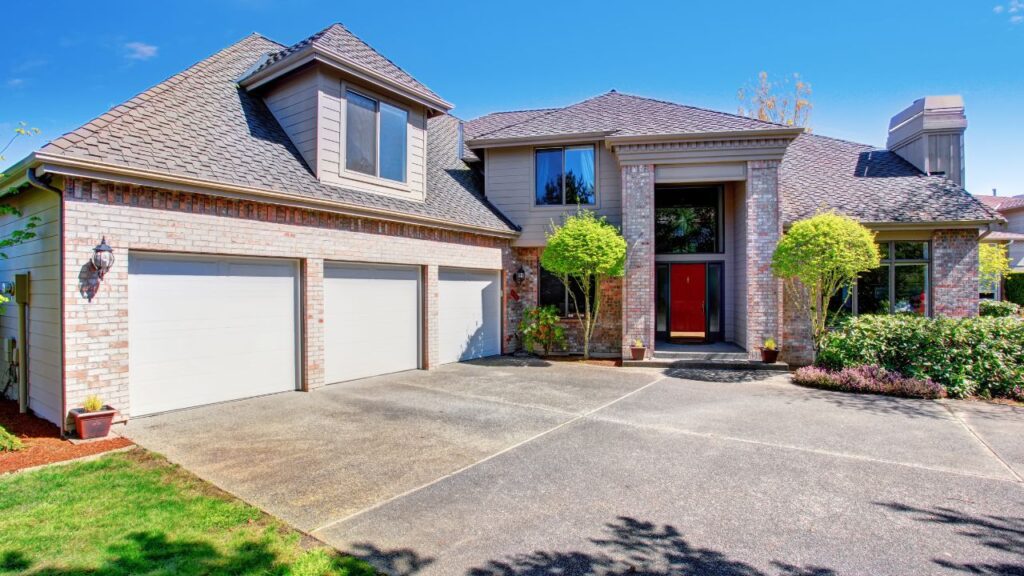
The distance to the gravel supplier influences delivery and transportation costs.
To optimize costs, consider using more affordable gravel for hidden layers while reserving higher-quality gravel for the top layer.

Transform your projects with precision and expertise by scheduling a personalized consultation today. Our experts are ready to guide you through a tailored process that will elevate your estimating game.
Upload Your PlanOne aspect often overlooked is the natural shifting of gravel over time.
Top-dressing should be performed every few years or when the driveway starts to lose its appeal or effectiveness.
A Driveway Gravel Estimator is a tool or service designed to assist homeowners, property owners, or contractors in estimating the costs associated with installing gravel on a driveway. It considers various factors to provide an approximate cost for the project.
Users typically input details about their driveway project, including the dimensions of the area, desired gravel thickness, type of gravel, and any specific requirements. The Driveway Gravel Estimator then uses this information to generate an estimated cost for the installation of gravel on the driveway.
Several factors can influence driveway gravel installation costs, including the size of the driveway, choice of gravel type (e.g., pea gravel, crushed stone), desired thickness, site preparation requirements, and local labor rates. The Driveway Gravel Estimator considers these variables to provide a more accurate estimate.
While basic design preferences can be considered, intricate or highly customized designs may not be fully captured by a Driveway Gravel Estimator. Consulting with landscaping professionals may be necessary for accurate cost assessments of specialized designs.
While Driveway Gravel Estimators provide valuable estimates, actual costs may vary based on factors such as site conditions, accessibility, and any unforeseen challenges during installation. It’s advisable to use the estimates as a reference and consult with landscaping experts for more accurate pricing.
Here I am going to share some steps to get a driveway gravel estimate report.
You can send us your plan on info@estimatorflorida.com
Before starting your project, we send you a quote for your service. That quote will have detailed information about your project. Here you will get information about the size, difficulty, complexity and bid date when determining pricing.
Our team will takeoff and estimate your project. When we deliver you’ll receive a PDF and an Excel file of your estimate. We can also offer construction lead generation services for the jobs you’d like to pursue further.



561-530-2845
info@estimatorflorida.com
Address
5245 Wiles Rd Apt 3-102 St. Pete Beach, FL 33073 United States
561-530-2845
info@estimatorflorida.com
Address
5245 Wiles Rd Apt 3-102 St. Pete Beach, FL 33073 United States
All copyright © Reserved | Designed By V Marketing Media | Disclaimer